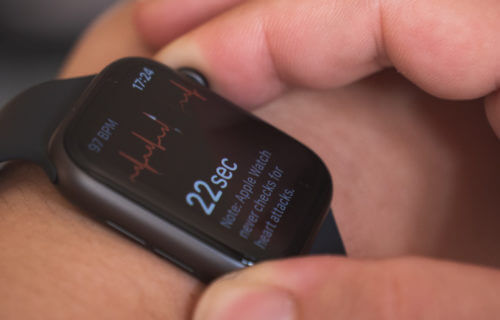BORDEAUX, France — Health apps on smartwatches and smartphones still aren’t capable of accurately detecting an irregular heartbeat, according to the largest study to date on this topic. Researchers report current mobile health technology intended to detect atrial fibrillation generates “a high rate” of false positives and inconclusive results in some patients with certain cardiac conditions.
While more traditional means of tracking the heart are available, such as extended cardiac monitoring and the use of implantable cardiovascular electronic devices, these devices have their limits, including lacking real-time feedback and having a short battery life. Meanwhile, new smartphone apps and tools supposedly capable of recording an electrocardiogram (ECG) strip and subsequently making an automated diagnosis represent a major boon for heart patients the world over — but only if they really work. Study authors set out to determine the accuracy of such mobile technologies, ultimately finding “the use of these devices is challenging in patients with abnormal ECGs.”
Researchers believe superior algorithms and improved machine learning may help these tools provide more accurate diagnoses in the future.
“Earlier studies have validated the accuracy of the Apple Watch for the diagnosis of AF in a limited number of patients with similar clinical profiles,” explains lead investigator Marc Strik, MD, PhD, from Bordeaux University Hospital, in a media release. “We tested the accuracy of the Apple Watch ECG app to detect AF in patients with a variety of coexisting ECG abnormalities.”
This research encompassed 734 consecutive hospitalized patients, with each patient undergoing a 12-lead ECG, immediately followed by a 30-second Apple Watch recording. The team classified the smartwatch’s automated single-lead ECG AF (AFib) detections as either “no signs of atrial fibrillation,” “atrial fibrillation,” or “inconclusive reading.”
1 in 5 patients receive bad information from wearable technology
Recordings by the smartwatches went to an electrophysiologist who conducted a blinded interpretation, assigning each tracing a diagnosis of “AF,” “absence of AF,” or “diagnosis unclear.” Then, a second blinded electrophysiologist interpreted 100 randomly selected traces. This helped gauge the extent to which the two observers agreed.
In roughly one in every five patients, the smartwatch ECF failed to generate an automatic diagnosis. The odds of receiving a false positive automated AF detection were higher among patients with premature atrial and ventricular contractions (PACs/PVCs), sinus node dysfunction, and second or third-degree atrioventricular block. Among patients with AFib, the risk of having a false negative tracing (missed AF) was higher for those with ventricular conduction abnormalities (interventricular conduction delay) or rhythms controlled by a pacemaker.
Generally speaking, the two cardiac electrophysiologists shared a high level of agreement regarding differentiation between AF and non-AF. The smartphone app successfully identified 78 percent of patients in AFib and 81 percent of those who were not in AFib. The electrophysiologists, meanwhile, detected 97 percent of the patients who were in AFib and 89 percent who were not.
Patients with PVCs were also three times more likely to receive false positive AFib diagnoses from the smartwatch ECG. Additionally, the identification of patients with atrial tachycardia (AT) and atrial flutter (AFL) was quite poor.
“These observations are not surprising, as smartwatch automated detection algorithms are based solely on cycle variability,” Dr. Strik notes, explaining that PVCs cause short and long cycles, which increase cycle variability. “Ideally, an algorithm would better discriminate between PVCs and AF. Any algorithm limited to the analysis of cycle variability will have poor accuracy in detecting AT/AFL. Machine learning approaches may increase smartwatch AF detection accuracy in these patients.”
Smartwatch algorithms ‘not yet smart enough’
In an accompanying editorial, Andrés F. Miranda-Arboleda, MD, and Adrian Baranchuk, MD, from Kingston Health Science Center, note this is the first ever “real-world” study focusing on the Apple Watch as a diagnostic tool for AFib.
“It is of remarkable importance because it allowed us to learn the performance of the Apple Watch in the diagnosis of AF is significantly affected by the presence of underlying ECG abnormalities. In a certain manner, the smartwatch algorithms for the detection of AF in patients with cardiovascular conditions are not yet smart enough. But they may soon be,” the doctors add.
“With the growing use of smartwatches in medicine, it is important to know which medical conditions and ECG abnormalities could impact and alter the detection of AF by the smartwatch in order to optimize the care of our patients,” Dr. Strik concludes. “Smartwatch detection of AF has great potential, but it is more challenging in patients with pre-existing cardiac disease.”
The study is published in the Canadian Journal of Cardiology.

